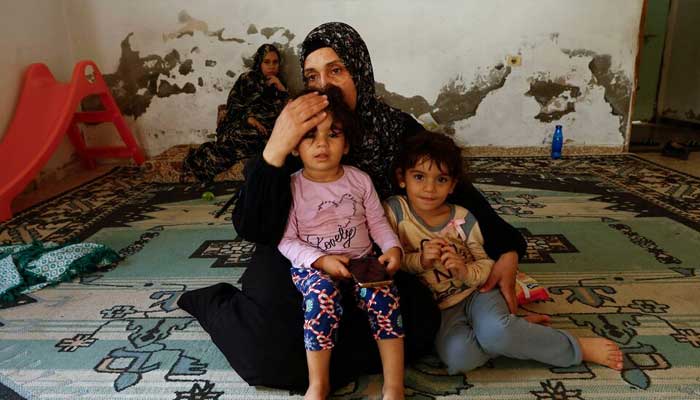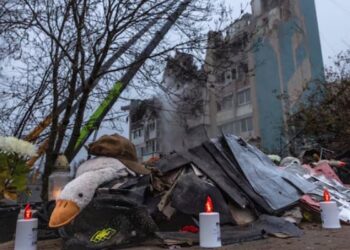Select Language:
A Palestinian woman named Samah Abu Latifa, who escaped her home amid Israeli bombardments, is sheltering with her family in a kindergarten in Khan Younis, located in the southern Gaza Strip, on October 10, 2023. — Reuters
After two years of conflict, numerous displacements, and the loss of her husband and father, Lamis Dib’s life in Gaza revolves around a constant struggle for survival.
“The situation is beyond words,” said the 31-year-old mother of two, describing the ongoing devastation in Palestinian territories.
“Friday, October 6, 2023, was a beautiful day before the war started,” she reminisced.
Her eldest daughter, Suwar, who was just five and had recently begun kindergarten, would come home each afternoon, and Dib would watch her from their apartment window in Sheikh Radwan, a middle-class neighborhood in northern Gaza City.
Her three-year-old son Amin kept her busy, according to Dib, who often took him to the nearby seaside.
Although Dib studied social work, she couldn’t find employment in Gaza’s struggling economy, which has been hampered by a strict Israeli blockade since 2007.
Nonetheless, she had built a joyful family life with her husband, an accountant who ensured she “never wanted for anything.”
Their neighborhood was among the first targeted by Israeli strikes in October 2023.
Since then, Israel’s military campaign has resulted in the deaths of at least 66,225 Palestinians in Gaza—mostly civilians, according to the health ministry, which is recognized as reliable by the United Nations.
The destruction across Gaza is extensive, with neighborhoods leveled and millions of tons of debris covering former homes.
Critical infrastructure such as buildings, hospitals, schools, and water and sanitation systems has suffered severe damage, leaving the territory’s more than two million residents in dire conditions.
Hundreds of thousands of Gazans have become homeless, seeking refuge in shelters, makeshift camps, or outdoor spaces, often without adequate protection.
Race Against Death
When Dib’s area came under attack, she and her family fled to a nearby district, marking the first of multiple displacements, before eventually relocating south to Khan Yunis.
“One of the hardest days of our lives,” Dib recalled, describing the arduous journey over damaged roads and past military checkpoints.
She and her children have been displaced 11 times amidst ongoing clashes between Israel and Hamas.
“Every move felt like a race to stay alive, under constant airstrikes. I was on autopilot, carrying my kids, holding them close, running without looking back or knowing where we were going,” she explained.
During their time in Rafah in the south, scarcity and overcrowding were commonplace.
Her family endured six months in a cramped shelter, with 30 people crammed into a single room, lacking toilets and basic hygiene. Dib described the experience as suffocating: confinement, relentless airstrikes, hunger, thirst, and total privacy loss.
By August 2024, Dib’s life took another tragic turn while living in the Nuseirat refugee camp in central Gaza. Her husband and father were atop a rooftop with five other family members when they heard the sound of a missile and saw smoke.
“I ran towards the roof, and it was unthinkable—everyone was dead,” she said.
“My husband’s body seemed intact, and I thought he was still alive. I tried to wake him, but he had been hit in the head. Then I saw my father’s body… his hand had been blown off.”
From that point, Dib became the sole caregiver for her children during the darkest period Gaza had seen.
She moved into a tent in Al-Zawayda, a camp where thousands of Palestinians live under tarps flapping in the wind, exposed to summer heat and winter rains.
“Every day is hard,” she said from within her shelter.
While others can lean on family members for support, Dib faces constant financial hardship on her own.
Although Israel eased a full blockade on supplies in May 2025, humanitarian aid remains insufficient, according to the UN.
“Our children have lost their right to education, proper nutrition, and a normal childhood,” she said, with Suwar and Amin studying on her knees nearby.
They sometimes glance at pictures of their father and relatives killed during the war on Dib’s phone.
“We will return home and rebuild,” she promised. “All we want is a little peace.”
Like their mother, Suwar and Amin focus on survival, helping fill water containers at a makeshift station near the tent.
For them, the war’s trauma and loss might linger longer than the airstrikes themselves.
In 2024, UNICEF estimated that every child in Gaza needed psychological support, underlining the deep emotional scars inflicted by ongoing conflict.







